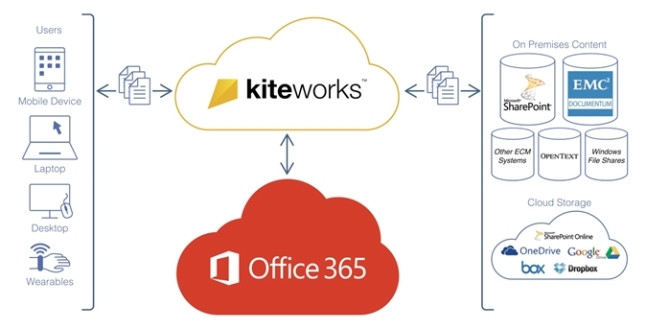Enterprise content is growing at an exponential rate, and files are being stored in a wide variety of places, including Enterprise Content Management (ECM) platforms, such as Microsoft SharePoint, Documentum and OpenText as well as public cloud storage solutions, like Box and Google Drive. Making this content accessible to users across devices presents challenges for most enterprise organisations. Files stored in ECM platforms are not easily accessible to users outside of the office, as ECM platforms typically require a VPN, and public cloud solutions often don't have the security and compliance controls that enterprise IT teams require.
"In order to improve and secure content access, enterprises need to provide secure access to all content wherever it is stored, from any device," says Sean Glansbeek CEO of Private Protocol.
Why are so many employees signing up for personal content storage services?
Often it is because employees need a convenient solution for accessing enterprise content via laptops, desktops, tablets, and smartphones. At the same time that enterprises have been investing in ECM platforms, employees have been investing in mobile computing. Employees are using multiple devices for a growing portion of work. For example, employees now check e-mail on mobile devices more often than on desktop computers. In most enterprises, employees are using personal devices to access and collaborate on business files. Because employees want access to all files on all devices, employees sign up for free file sharing and sync services like Dropbox, regardless of the resulting security risks and policy violations.
To improve file access, some enterprises duplicate ECM content on external file servers, increasing IT costs and undermining the security access controls built into ECM platforms. A riskier solution occurs when employees, "engineer," personal file sharing solutions by signing up for public cloud services, such as Dropbox. Public cloud services make file sharing quick and easy, both across a user's own devices as well as with folders owned by other users, including users outside the enterprise. Unfortunately, this quick-and-easy access occurs without the oversight and control of the IT department through solutions, such as DLP and other enterprise infrastructure.
The Accellion Solution: kiteworks and Cloud Content Connectors
Kiteworks by Accellion is a secure content platform for sharing files, providing enterprise users with a superior user experience and greater productivity; while offering best-in-class IT security and governance. Kiteworks was designed to make accessing, sharing, editing, and annotating files easy and secure across multiple devices - laptops, desktops, tablets, and smartphones.
Kiteworks provides a secure container on mobile devices for accessing, reading, editing, and annotating files. It also supports task management, threaded discussions, and microblogging; enabling users to quickly understand the context of the files that are used for work.

"By eliminating the need for cumbersome VPN clients, Kiteworks makes secure content access quick and easy, increasing employee productivity. At the same time, it provides the rigorous security and compliance measures that enterprises require, especially in government agencies and regulated industries" concludes Glansbeek.
Share
Accellion
Accellion provides secure access to enterprise content wherever it is stored to enable increased enterprise productivity and ensure data security and compliance. Accellion is the leading provider of private cloud solutions offering enterprise organisations the scalability, flexibility, control and security to enable a global workforce with the tools they need to securely create, access and share information, wherever work takes them. Accellion solutions are used by more than 15 million users and 2 500 of the world's leading corporations and government agencies including Procter & Gamble; Indiana University Health; Kaiser Permanente; Hogan Lovells; Bridgestone; Harvard University; US Securities and Exchange Commission; and Nasa.
Private Protocol
Private Protocol is a data security provider offering solutions and strategies that cover mobile device and information security, secure data collaboration, SharePoint/O365 security and compliance, data classification, file share security and compliance, web content compliance, data leakage prevention, endpoint security and cloud security. Private Protocol also offer data risk assessments so companies can understand where their data resides, where their data is going, who is using it and what devices are connecting to the network. Private Protocol cover Africa and Indian Ocean Islands and also have a distributed partner channel.
Web site - www.privateprotocol.com
Editorial contacts